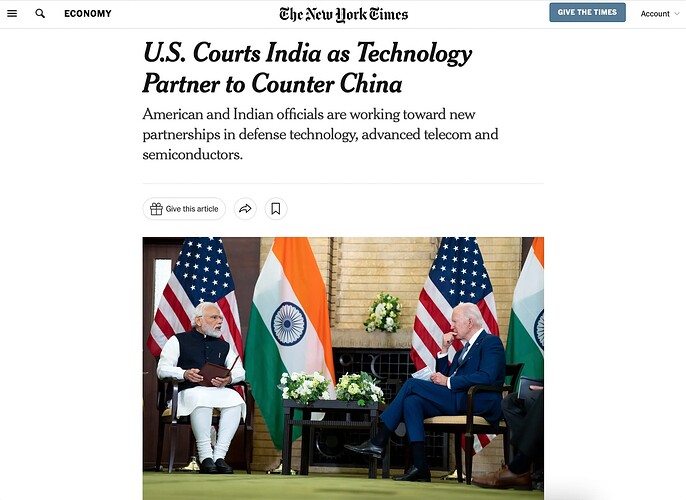-
美国和印度已同意扩大在先进武器装备、超级计算、半导体和其他高科技领域的合作。
-
此前,美国政府官员和公司高管在华盛顿举行了第一次高级别会议,这是一次关于关键和新兴技术的新对话。
-
美国国家安全顾问杰克-沙利文说,目标是使技术伙伴关系成为继2016年核电合作协议之后美印关系的 “下一个重大里程碑”。
-
这些伙伴关系将是对拜登政府提出的 "朋友圈 "建议的考验,该建议旨在将某些关键部件的制造转移到友好国家。
-
印度拥有高度熟练的劳动力,政府希望吸引更多的国际投资,但跨国公司仍然面临着繁琐的法规、不足的基础设施和其他障碍。
-
这些伙伴关系包括美国和印度国家科学机构在人工智能和先进无线技术方面的合作,以及加快联合生产和开发国防技术的努力,如喷气发动机和火炮系统。
-
两国还将努力促进在印度建立一个先进的移动网络,并在半导体生产方面进行合作。
-
然而,印度将需要继续改革其许可和税收制度,以吸引更多的外国制造公司,而美国将需要改革对国防相关技术向国外转让的限制。
-
许多技术合作关系将取决于私营部门之间的新联系,公司将考虑商业案例和战略案例一样多。
-
在贸易谈判中,印度历来是美国的一个困难伙伴,但在国家安全问题上更有积极性,并被与美国合作培养尖端科技产业的前景所吸引。
-
The US and India have agreed to expand cooperation on advanced weaponry, supercomputing, semiconductors, and other high-tech fields.
-
This follows the first high-level meeting between US government officials and executives from companies in Washington, which was a new dialogue about critical and emerging technologies.
-
The US national security advisor, Jake Sullivan, says that the goal is to make technological partnerships “the next big milestone” in the US-India relationship after a 2016 agreement on nuclear power cooperation.
-
The partnerships will be a test of the Biden administration’s proposal for “friendshoring,” which aims to shift the manufacturing of certain critical components to friendly countries.
-
India has a highly skilled workforce and the government wants to attract more international investment, but multinational companies continue to face onerous regulations, inadequate infrastructure, and other barriers.
-
The partnerships include cooperation between the US and Indian national science agencies on AI and advanced wireless technology, as well as speeding up efforts to jointly produce and develop defense technologies, such as jet engines and artillery systems.
-
The countries will also work to facilitate the build-out of an advanced mobile network in India and cooperate in semiconductor production.
-
However, India will need to continue to reform its permitting and tax system to attract more foreign manufacturing companies, and the US will need to reform restrictions on transferring defense-related technology outside the country.
-
Many of the technology partnerships will hinge on new connections between the private sectors, and companies will consider the business case as much as the strategic case.
-
India has traditionally been a difficult partner for the US in trade negotiations, but is more motivated in national security matters and attracted to the prospects of working with the US to cultivate cutting-edge tech industries.
链接:U.S. Courts India as Technology Partner to Counter China - The New York Times
